#social guide
Explore tagged Tumblr posts
Text


Direct action, simply put, means cutting out the middleman: solving problems yourself rather than petitioning the authorities or relying on external institutions. Any action that sidesteps regulations and representation to accomplish goals directly is direct action—it includes everything from blockading airports to helping refugees escape to safety and organizing programs to liberate your community from reliance on capitalism. Here we present a step-by-step guide to organizing and carrying out direct action, from the first planning stages to the debrief at the end, including legal support, media strategy, and proper security.
There are countless scenarios in which you might want to employ direct action. Perhaps representatives of despicable multinational corporations are invading your town to hold a meeting, and you want to do more than simply hold a sign; perhaps they’ve been there a long time, operating franchises that exploit workers and ravage the environment, and you want to hinder their misdeeds; perhaps you want to organize a festive, community-oriented event such as a street party. Direct action can plant a public garden in an abandoned lot or defend it by paralyzing bulldozers; it can occupy empty buildings to house the homeless or shut down government offices. Whether you’re acting in secret with a trusted friend or in a mass action with thousands of people, the basic elements are the same.
#direct action#how-to#guides#manuals#anarchism#anarchy#anarchist society#practical anarchy#practical anarchism#resistance#autonomy#revolution#communism#anti capitalist#anti capitalism#late stage capitalism#daily posts#libraries#leftism#social issues#anarchy works#anarchist library#survival#freedom#CrimethInc
1K notes
·
View notes
Text
Social Battery
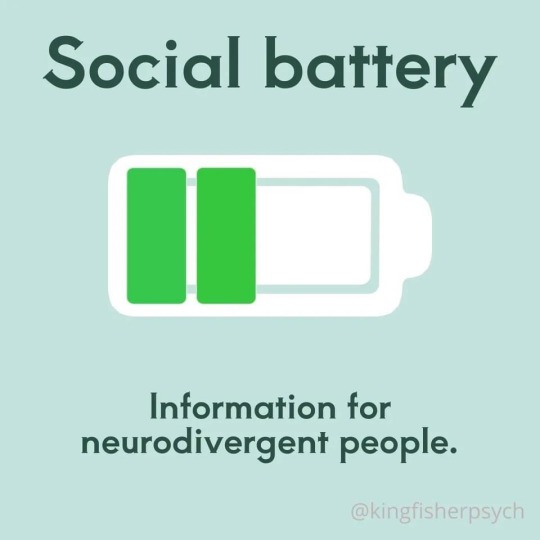
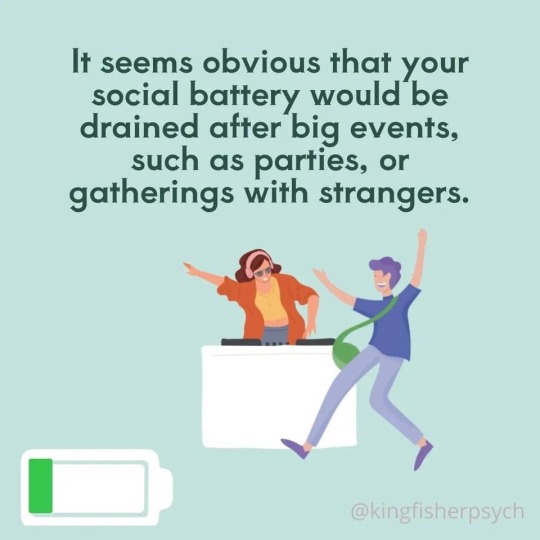
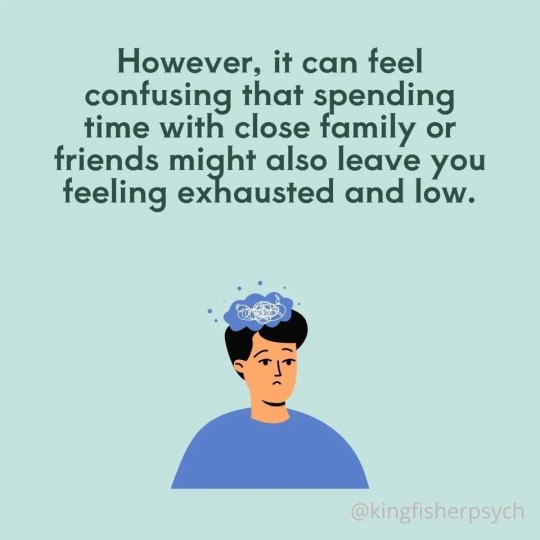

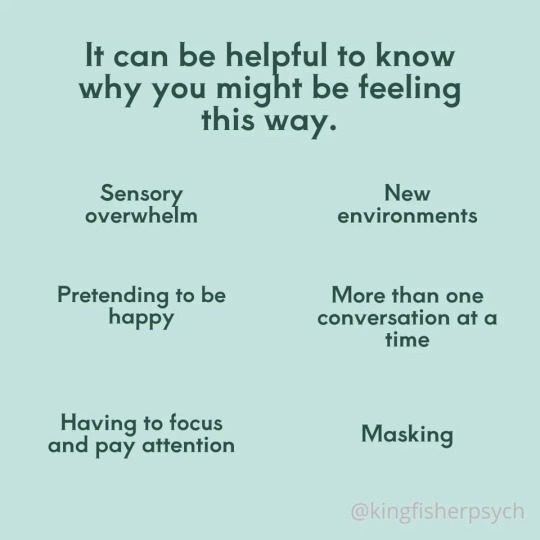
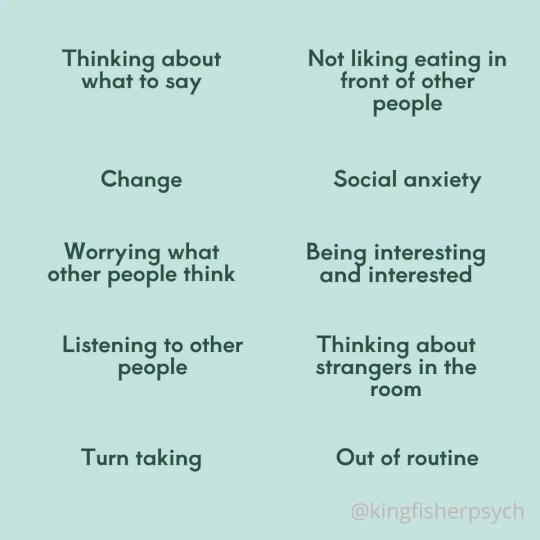

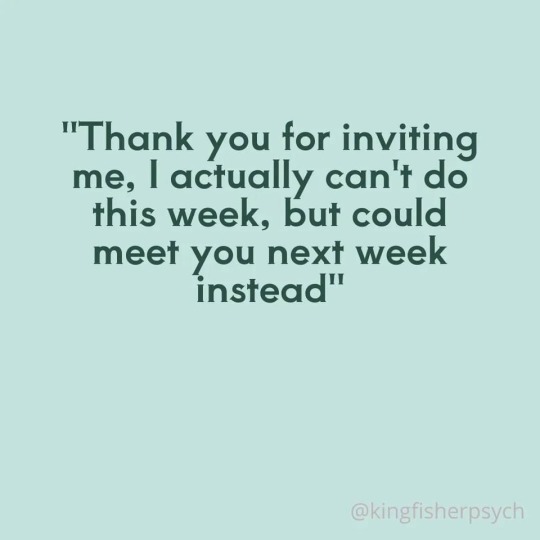
Kingfisher Psychology
#social battery#socializing#I struggle with these so much#especially if there’s a lot of people#I can’t stand the loud talking everywhere#but I still go out to restaurants#neurodiversity#actually neurodivergent#social guide for neurodivergents#feel free to share/reblog#KingFisher Psychology (Facebook)
508 notes
·
View notes
Text
say what you want about the accent but the agggtm tv show is giving so much life to the autistic pip headcanon
#like she’s SO awkward. SO much#so literal & misses social cues & has special interests & just !!!!!#she’s autistic in my heart i always knew it#agggtm#a good girls guide to murder#pip fitz amobi
436 notes
·
View notes
Text
Yanis Varoufakis’s “Technofeudalism: What Killed Capitalism?”

Monday (October 2), I'll be in Boise to host an event with VE Schwab. On October 7–8, I'm in Milan to keynote Wired Nextfest.

Socialists have been hotly anticipating the end of capitalism since at least 1848, when Marx and Engels published The Communist Manifesto - but the Manifesto also reminds us that capitalism is only too happy to reinvent itself during its crises, coming back in new forms, over and over again:
https://www.nytimes.com/2022/10/31/books/review/a-spectre-haunting-china-mieville.html
Now, in Technofeudalism: What Killed Capitalism, Yanis Varoufakis - the "libertarian Marxist" former finance minister of Greece - makes an excellent case that capitalism died a decade ago, turning into a new form of feudalism: technofeudalism:
https://www.penguin.co.uk/books/451795/technofeudalism-by-varoufakis-yanis/9781847927279
To understand where Varoufakis is coming from, you need to go beyond the colloquial meanings of "capitalism" and "feudalism." Capitalism isn't just "a system where we buy and sell things." It's a system where capital rules the roost: the richest, most powerful people are those who coerce workers into using their capital (factories, tools, vehicles, etc) to create income in the form of profits.
By contrast, a feudal society is one organized around people who own things, charging others to use them to produce goods and services. In a feudal society, the most important form of income isn't profit, it's rent. To quote Varoufakis: "rent flows from privileged access to things in fixed supply" (land, fossil fuels, etc). Profit comes from "entrepreneurial people who have invested in things that wouldn't have otherwise existed."
This distinction is subtle, but important: "Profit is vulnerable to market competition, rent is not." If you have a coffee shop, then every other coffee shop that opens on your block is a competitive threat that could erode your margins. But if you own the building the coffee shop owner rents, then every other coffee shop that opens on the block raises the property values and the amount of rent you can charge.
The capitalist revolution - extolled and condemned in the Manifesto - was led by people who valorized profits as the heroic returns for making something new in this world, and who condemned rents as a parasitic drain on the true producers whose entrepreneurial spirits would enrich us all. The "free markets" extolled by Adam Smith weren't free from regulation - they were free from rents:
https://locusmag.com/2021/03/cory-doctorow-free-markets/
But rents, Varoufakis writes, "survived only parasitically on, and in the shadows of, profit." That is, rentiers (people whose wealth comes from rents) were a small rump of the economy, slightly suspect and on the periphery of any consideration of how to organize our society. But all that changed in 2008, when the world's central banks addressed the Great Financial Crisis by bailing out not just the banks, but the bankers, funneling trillions to the people whose reckless behavior brought the world to the brink of economic ruin.
Suddenly, these wealthy people, and their banks, experienced enormous wealth-gains without profits. Their businesses lost billions in profits (the cost of offering the business's products and services vastly exceeded the money people spent on those products and services). But the business still had billions more at the end of the year than they'd had at the start: billions in public money, funneled to them by central banks.
This kicked off the "everything rally" in which every kind of asset - real estate, art, stocks, bonds, even monkey JPEGs - ballooned in value. That's exactly what you'd expect from an economy where rents dominate over profits. Feudal rentiers don't need to invest to keep making money - remember, their wealth comes from owning things that other people invest in to make money.
Rents are not vulnerable to competition, so rentiers don't need to plow their rents into new technology to keep the money coming in. The capitalist that leases the oil field needs to invest in new pumps and refining to stay competitive with other oil companies. But the rentier of the oil field doesn't have to do anything: either the capitalist tenant will invest in more capital and make the field more valuable, or they will lose out to another capitalist who'll replace them. Either way, the rentier gets more rent.
So when capitalists get richer, they spend some of that money on new capital, but when rentiers get richer, them spend money on more assets they can rent to capitalists. The "everything rally" made all kinds of capital more valuable, and companies that were transitioning to a feudal footing turned around and handed that money to their investors in stock buybacks and dividends, rather than spending the money on R&D, or new plants, or new technology.
The tech companies, though, were the exception. They invested in "cloud capital" - the servers, lines, and services that everyone else would have to pay rent on in order to practice capitalism.
Think of Amazon: Varoufakis likens shopping on Amazon to visiting a bustling city center filled with shops run by independent capitalists. However, all of those capitalists are subservient to a feudal lord: Jeff Bezos, who takes 51 cents out of every dollar they bring in, and furthermore gets to decide which products they can sell and how those products must be displayed:
https://pluralistic.net/2022/11/28/enshittification/#relentless-payola
The postcapitalist, technofeudal world isn't a world without capitalism, then. It's a world where capitalists are subservient to feudalists ("cloudalists" in Varoufakis's thesis), as are the rest of us the cloud peons, from the social media users and performers who fill the technofuedalists' siloes with "content" to the regular users whose media diet is dictated by the cloudalists' recommendation systems:
https://pluralistic.net/2023/01/21/potemkin-ai/#hey-guys
A defining feature of cloudalism is the ability of the rentier lord to destroy any capitalist vassal's business with the click of a mouse. If Google kicks your business out of the search index, or if Facebook blocks your publication, or if Twitter shadowbans mentions of your product, or if Apple pulls your app from the store, you're toast.
Capitalists "still have the power to command labor from the majority who are reliant on wages," but they are still mere vassals to the cloudalists. Even the most energetic capitalist can't escape paying rent, thanks in large part to "IP," which I claim is best understood as "laws that let a company reach beyond its walls to dictate the conduct of competitors, critics and customers":
https://locusmag.com/2020/09/cory-doctorow-ip/
Varoufakis points to ways that the cloudalists can cement their gains: for example, "green" energy doesn't rely on land-leases (like fossil fuels), but it does rely on networked grids and data-protocols that can be loaded up with IP, either or both of which can be turned into chokepoints for feudal rent-extraction. To make things worse, Varoufakis argues that cloudalists won't be able to muster the degree of coordination and patience needed to actually resolve the climate emergency - they'll not only extract rent from every source of renewables, but they'll also silo them in ways that make them incapable of doing the things we need them to do.
Energy is just one of the technofeudal implications that Varoufakis explores in this book: there are also lengthy and fascinating sections on geopolitics, monetary policy, and the New Cold War. Technofeudalism - and the struggle to produce a dominant fiefdom - is a very useful lens for understanding US/Chinese tech wars.
Though Varoufakis is laying out a technical and even esoteric argument here, he takes great pains to make it accessible. The book is structured as a long open letter to his father, a chemical engineer and leftist who was a political prisoner during the fascist takeover of Greece. The framing device works very well, especially if you've read Talking To My Daughter About the Economy, Varoufakis's 2018 radical economics primer in the form of a letter to his young daughter:
https://us.macmillan.com/books/9780374538491/talkingtomydaughterabouttheeconomy
At the very end of the book, Varoufakis calls for "a cloud rebellion to overthrow technofeudalism." This section is very short - and short on details. That's not a knock against the book: there are plenty of very good books that consist primarily or entirely of analysis of the problems with a system, without having to lay out a detailed program for solving those problems.
But for what it's worth, I think there is a way to plan and execute a "cloud rebellion" - a way to use laws, technology, reverse-engineering and human rights frameworks to shatter the platforms and seize the means of computation. I lay out that program in The Internet Con: How the Seize the Means of Computation, a book I published with Verso Books a couple weeks ago:
https://www.versobooks.com/products/3035-the-internet-con

If you'd like an essay-formatted version of this post to read or share, here's a link to it on pluralistic.net, my surveillance-free, ad-free, tracker-free blog:
https://pluralistic.net/2023/09/28/cloudalists/#cloud-capital
#pluralistic#yanis varoufakis#socialism#communism#technofeudalism#economics#postcapitalism#political science#rent-seeking#rentiers#books#reviews#gift guide
734 notes
·
View notes
Text
𝐀 𝐒𝐓𝐎𝐍𝐄𝐑'𝐒 𝐆𝐔𝐈𝐃𝐄 𝐓𝐎 𝐒𝐓𝐀𝐑𝐁𝐔𝐂𝐊𝐒 35. 7.83 inches
warning: they talk about dicks because they’re men



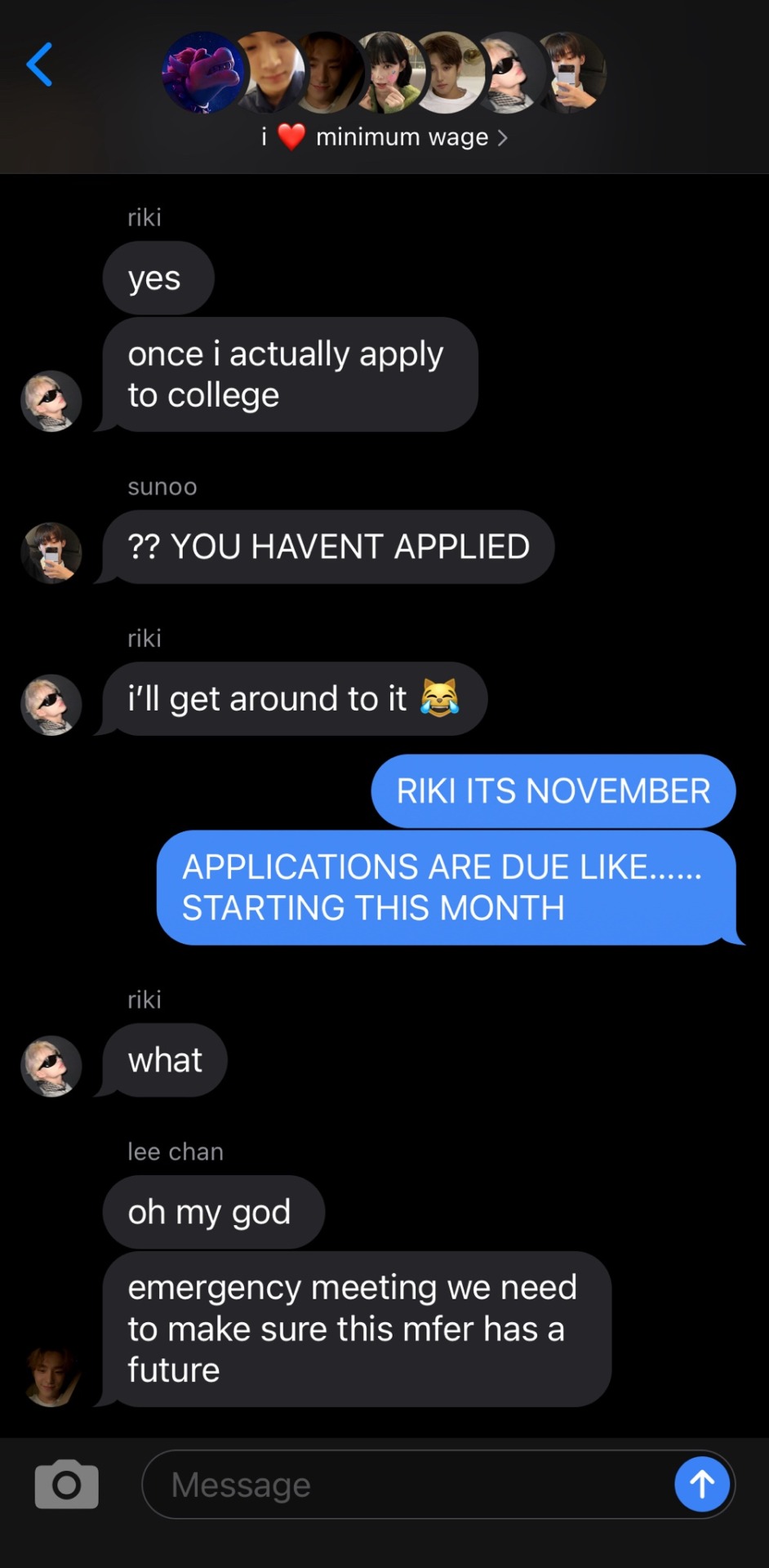



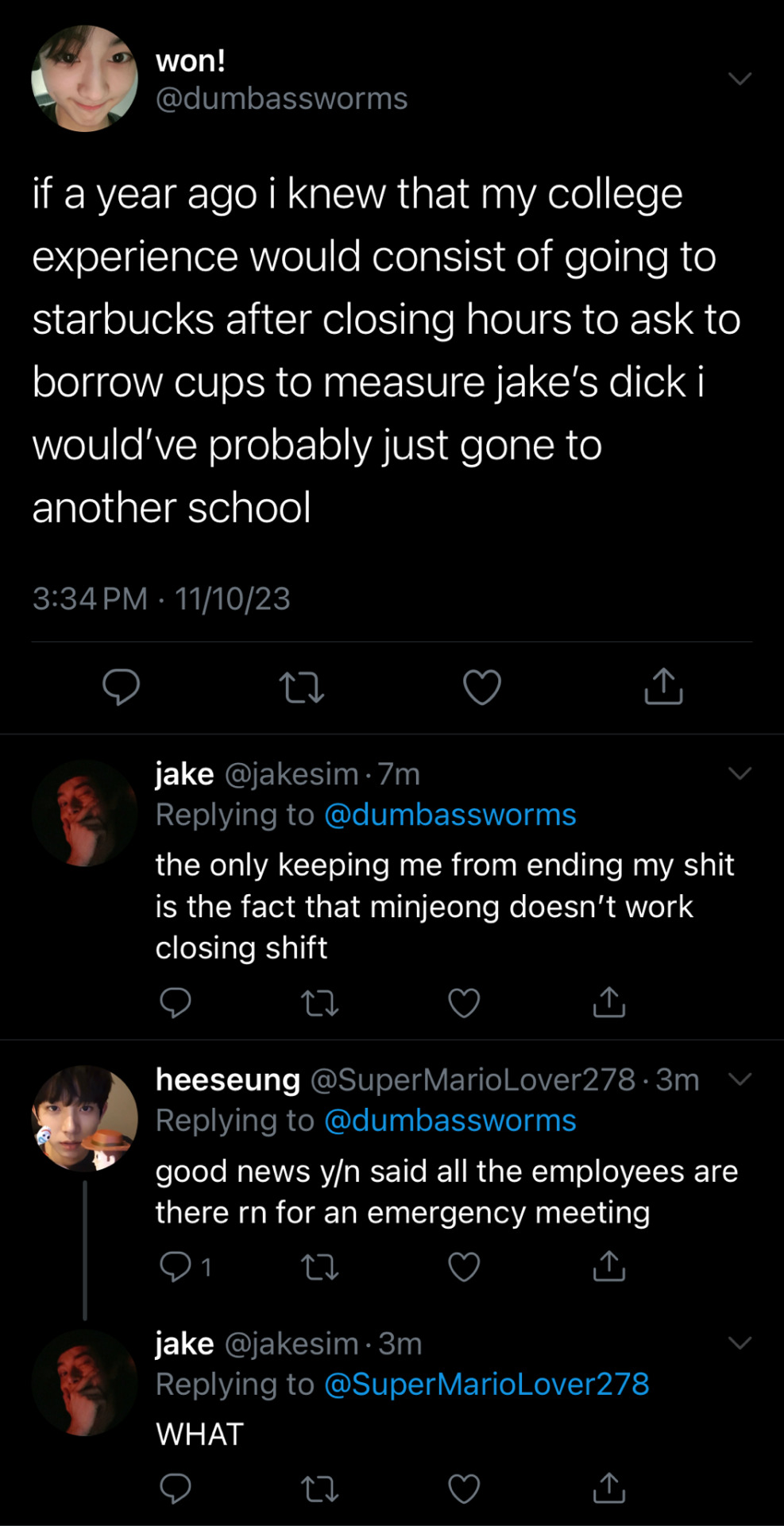
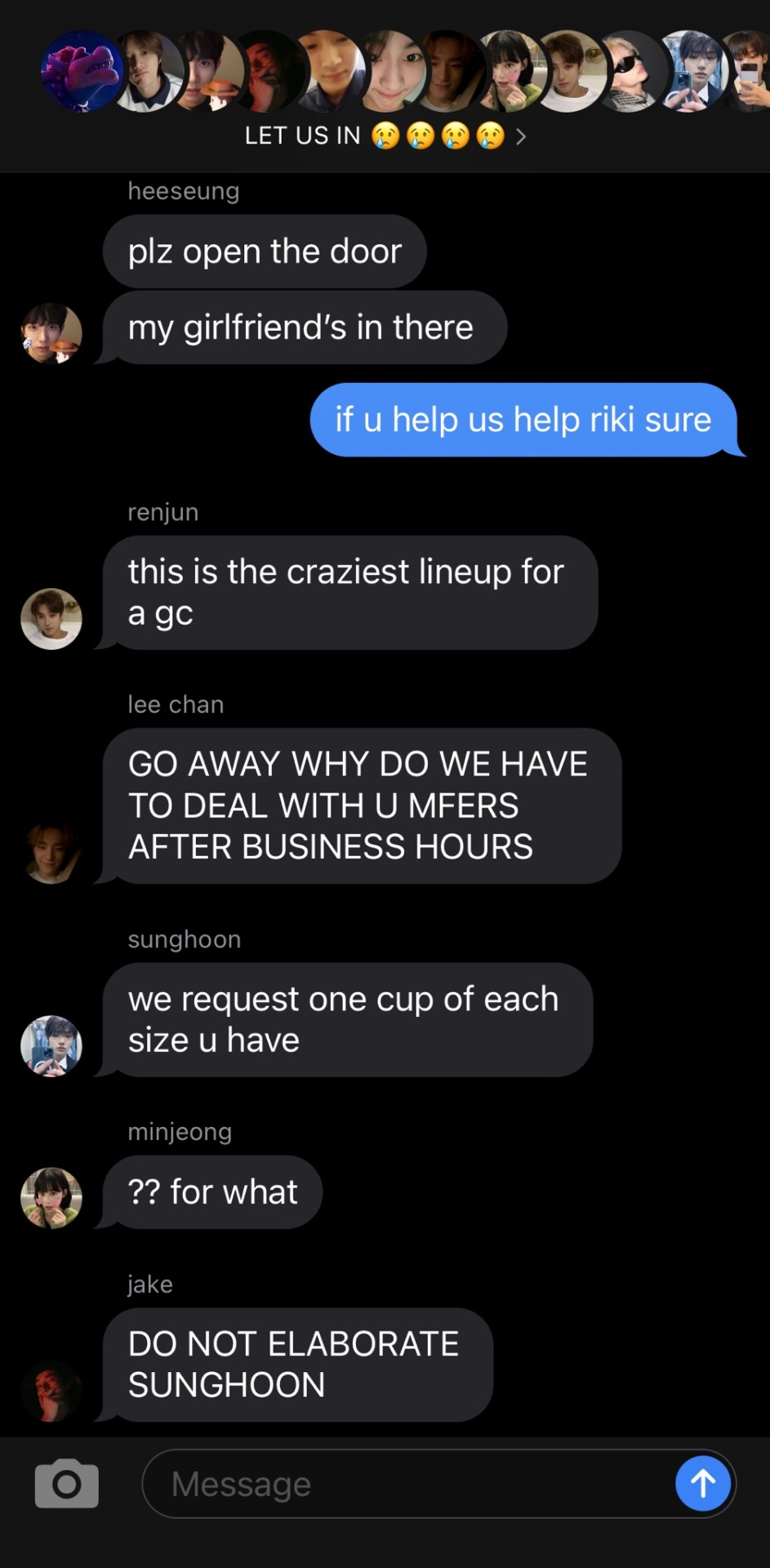
prev | masterlist | next
SUMMARY ▸ in which you work at the starbucks where heeseung is a regular at (and considered a public enemy). also he only goes when he’s stoned off his ass.
#hi guys im back 😆 a stoners guide to jayflrt i have commitment issues#enhypen#enhypen smau#enhypen fluff#heeseung fluff#heeseung smau#heeseung imagines#enhypen imagines#lee heeseung#enhypen social media au#heeseung x reader#enhypen x reader#heeseung scenarios#enhypen scenarios#heeseung drabbles#enhypen drabbles#heeseung reactions#enhypen reactions
515 notes
·
View notes
Text
How to Make Friends
A more-or-less clear guide on social interactions
Growing up with heavy ADHD and generalized anxiety, it was always a bit hard for me to make friends and socialize. Despite my yearning for friendship, I was always "the quiet one" and "a loner", simply because I didn't know how to approach certain social situations, and it made any friendship I had extremely unstable (except for my sister @vive-le-quebec-flouffi, who was so extroverted and friendly it was literally impossible to escape her clutches of socialization)
As I grew older, I learned through a lot of trial and error what makes a good friendship.
Or, rather... what's the best way for someone to WANT to be your friend (without being superficial or hypocritical.)
Now, obviously, this doesn't work for everyone. But this is what I found helped me the most in social circles (especially online) and I hope it can help others too
LET'S BEGIN!
1 - Be yourself
Now that sounds very cliche and cringe, I know, but hear me out, because my opinion on this is not the same as all those feelgood inspirational movies and ads.
"Being yourself" isn't as simple as it seems. Because after all, what does "self" imply? If someone is, say, a criminal, would "be yourself" mean that they should embrace their sinful side?
No, obviously not.
"Be yourself" is a bit more nuanced, but I'll try to boil it down for you.
It just means "be unashamed of your qualities which you think are flaws". For example, "be yourself" would apply to someone who sees themselves as ugly, or maybe someone with an odd yet unharmful hobby, or a weird sense of fashion, or someone with say a handicap, a speech impediment. "Be yourself" is a sentence for the specific people who have genuine good in them, but are afraid to show it to others because they have been persecuted in the past, or are scared to be. It does NOT mean to accept genuine flaws. "Be yourself" does not include say violent anger issues, an addiction, a recent crime committed, or a generally unpleasant personality. Those are obviously not things to encourage. You can understand they may be a thing that happen to you, and accept it in your life, but that's different from being proud of it or encouraging it.
Speaking of personalities... let's talk about that
2 - Be kind
Now when some people hear that, they think it means "always smile no matter what, always look happy and positive, always agree with everyone just so you don't hurt their feelings, and never cause any drama", like you're Deku in My Hero Academia or Steven Universe in his titular show.
But that's... not quite that.
Obviously, kindness is something you use to help people feel better, to cheer up, and feel happy, and obviously to be kind, you need to have compassion, heart, empathy, and always put yourself in other people's shoes regardless of who they are. But it is not necessarily all-encompassing.
There's a rule that I think anyone learning kindness must learn. It's that sometimes, kindness means to be firm.
Not mean, of course. Not judgmental, not insensitive. Don't insult anyone, don't belittle or patronize anyone or make them feel inferior to you. That's still very rude and that's not what you want.
But what I mean is that sometimes, if you know that a person's actions towards something are wrong, especially if it's towards someone else, you must be able to point it out, and act accordingly. Don't just stand there and agree with them just because you don't want to hurt their feelings. You must still be able to know right from wrong. Kindness just means you won't be an ass about it, it doesn't mean to stay silent.
Hey, that brings me to point three!
3 - Show your own opinions
If there's one thing people hate just as much as meanness, it's those who stand by and do nothing about it.
Regardless of if you agree with them or not, if you say absolutely nothing when genuinely bad behaviour is happening, out of fear of "starting a fight", you are actively making the person who is being attacked feel alone.
I remember myself, when I was bullied in the first two grades of secondary school (11-13 years old for those who don't know) for "being ugly", I was told by my mother (who was friends with other kid's parents) that some of the kids "didn't hate me" and "didn't agree with the bullying". And I asked her "if they don't hate me, why won't they talk to me?" She never managed to answer that one. And it broke my heart, because outside of my sister, I had no one else.
Don't be like that. You may be scared of acting, but you know who would be grateful if you did act? The victims. And isn't their opinion of you much more important than the opinion of someone who acts with hatred and bigotry?
If you see someone suffering injustice, or even just hear someone who has a rather harmful opinion, don't be scared to tell them that you disagree. Obviously don't be an asshole about it, stay civil, but if you voice out your opinion, you will be seen as someone who stays true to their beliefs and is brave enough to stand up for them if the opportunity comes.
There's obviously much more that comes with social life (nonverbal cues, sense of humor, timing and mood), and I don't know everything (I'm just some random québécois girl on the internet). But I hope this was a bit more helpful. I did have fun writing this, at least. So I guess that's better than nothing!
#life hacks#tips#tips and tricks#useful#How to guide#How to#social media#social anxiety#anxitey#anxiété#adhd#actually adhd#adhd problems#neurodivergence#neurodivergent#neurodiversity#autism#autistic things#autistic adult#growing up autistic
590 notes
·
View notes
Text
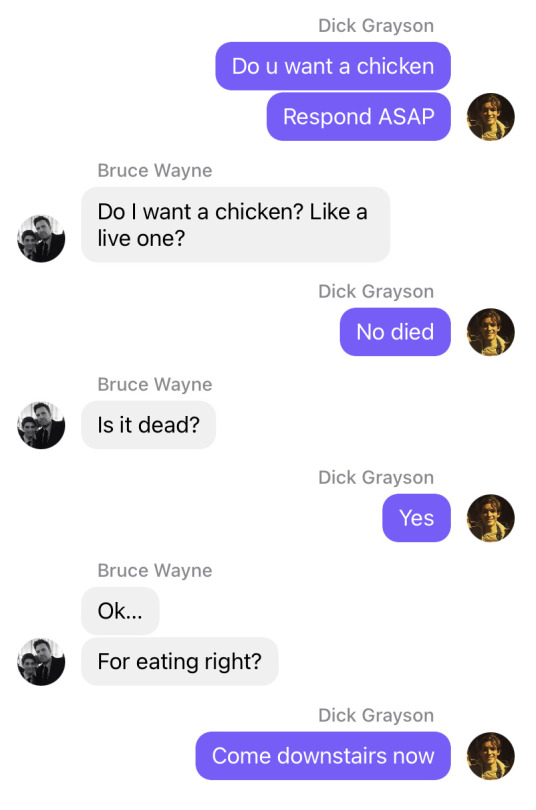
#batman#bruce wayne#gotham#robin#batman and robin#dick grayson#richard grayson#dick grayson wayne#dick grayson’s guide to shenanigans#dc batman#nightwing#dc nightwing#batfam socmed au#incorrect batfamily quotes#batfam social media#dc batfam#batfam shenanigans#batfamily#batfam#batbrats#batdad and batsons#batdad#brucie wayne#bruce and dick#dick and bruce#dick and his shenanigans#batson#batdad and batson#the waynes#the wayne family
289 notes
·
View notes
Note
hi! I remember you had a petticoat care guide at some point but I can't find it. can you point me to where I can look at the care instructions now that the petticoat preorders are being shipped out? thank you!
yes! i'll go ahead and put the care & storage information below:
--CARE-- Petticoats should be washed as infrequently as possible--one to two times a year at most. The best way to clean your petticoat is to steam it, which can also reinvigorate your petticoat's volume if it has been flattened. Otherwise, it is recommended to either dry clean or hand wash and line dry in the shade. Machine wash at your own risk. For best results with a machine, wash on a gentle cycle with cold water using a small amount of gentle detergent. Hang in shade to dry. Do not bleach. Do not tumble dry. Iron inside out on low heat. --STORAGE-- When possible, petticoats should be turned inside out and hung on a skirt hanger. For more compact storage, you can roll your petticoat by folding it at the waistband and then rolling it starting at the bottom hem and ending at the waistband, before placing it in a garment bag. If your petticoat has been flattened from storage, you can reinvigorate the volume with a steamer or by hanging it in your bathroom and taking a steamy shower.
here are some helpful links as well:
165 notes
·
View notes
Text


Turbulent times are upon us. Already, blockades, demonstrations, riots, and clashes are occuring regularly. It’s past time to be organizing for the upheavals that are on the way.
But getting organized doesn’t mean joining a pre-existing institution and taking orders. It shouldn’t mean forfeiting your agency and intelligence to become a cog in a machine. From an anarchist perspective, organizational structure should maximize both freedom and voluntary coordination at every level of scale, from the smallest group up to society as a whole.
You and your friends already constitute an affinity group, the essential building block of this model. An affinity group is a circle of friends who understand themselves as an autonomous political force. The idea is that people who already know and trust each other should work together to respond immediately, intelligently, and flexibly to emerging situations.
This leaderless format has proven effective for guerrilla activities of all kinds, as well as what the RAND Corporation calls “swarming” tactics in which many unpredictable autonomous groups overwhelm a centralized adversary. You should go to every demonstration in an affinity group, with a shared sense of your goals and capabilities. If you are in an affinity group that has experience taking action together, you will be much better prepared to deal with emergencies and make the most of unexpected opportunities.
This guide is adapted from an earlier version that appeared in our Recipes for Disaster: An Anarchist Cookbook.
Affinity Groups are Powerful
Relative to their small size, affinity groups can achieve a disproportionately powerful impact. In contrast to traditional top-down structures, they are free to adapt to any situation, they need not pass their decisions through a complicated process of ratification, and all the participants can act and react instantly without waiting for orders—yet with a clear idea of what to expect from one another. The mutual admiration and inspiration on which they are founded make them very difficult to demoralize. In stark contrast to capitalist, fascist, and socialist structures, they function without any need of hierarchy or coercion. Participating in an affinity group can be fulfilling and fun as well as effective.
Most important of all, affinity groups are motivated by shared desire and loyalty, rather than profit, duty, or any other compensation or abstraction. Small wonder whole squads of riot police have been held at bay by affinity groups armed with only the tear gas canisters shot at them.
The Affinity Group is a Flexible Model
Some affinity groups are formal and immersive: the participants live together, sharing everything in common. But an affinity group need not be a permanent arrangement. It can serve as a structure of convenience, assembled from the pool of interested and trusted people for the duration of a given project.
A particular team can act together over and over as an affinity group, but the members can also break up into smaller affinity groups, participate in other affinity groups, or act outside the affinity group structure. Freedom to associate and organize as each person sees fit is a fundamental anarchist principle; this promotes redundancy, so no one person or group is essential to the functioning of the whole, and different groups can reconfigure as needed.
Pick the Scale That’s Right for You
An affinity group can range from two to perhaps as many as fifteen individuals, depending on your goals. However, no group should be so numerous that an informal conversation about pressing matters is impossible. You can always split up into two or more groups if need be. In actions that require driving, the easiest system is often to have one affinity group to each vehicle.
Get to Know Each Other Intimately
Learn each other’s strengths and vulnerabilities and backgrounds, so you know what you can count on each other for. Discuss your analyses of each situation you are entering and what is worth accomplishing in it—identify where they match, where they are complentary, and where they differ, so you’ll be ready to make split-second decisions.
One way to develop political intimacy is to read and discuss texts together, but nothing beats on-the-ground experience. Start out slow so you don’t overextend. Once you’ve established a common language and healthy internal dynamics, you’re ready to identify the objectives you want to accomplish, prepare a plan, and go into action.
Decide Your Appropriate Level of Security
Affinity groups are resistant to infiltration because all members share history and intimacy with each other, and no one outside the group need be informed of their plans or activities.
Once assembled, an affinity group should establish a shared set of security practices and stick to them. In some cases, you can afford to be public and transparent about your activities. in other cases, whatever goes on within the group should never be spoken of outside it, even after all its activities are long completed. In some cases, no one except the participants in the group should know that it exists at all. You and your comrades can discuss and prepare for actions without acknowledging to outsiders that you constitute an affinity group. Remember, it is easier to pass from a high security protocol to a low one than vice versa.
Make Decisions Together
Affinity groups generally operate on via consensus decision-making: decisions are made collectively according to the needs and desires of every individual involved. Democratic voting, in which the majority get their way and the minority must hold their tongues, is anathema to affinity groups—for if a group is to function smoothly and hold together under stress, every individual involved must be satisfied. Before any action, the members of a group should establish together what their personal and collective goals are, what risks they are comfortable taking, and what their expectations of each other are. These matters determined, they can formulate a plan.
Since action situations are always unpredictable and plans rarely come off as anticipated, it may help to employ a dual approach to preparing. On the one hand, you can make plans for different scenarios: If A happens, we’ll inform each other by X means and switch to plan B; if X means of communication is impossible, we’ll reconvene at site Z at Q o’clock. On the other hand, you can put structures in place that will be useful even if what happens is unlike any of the scenarios you imagined. This could mean preparing resources (such as banners, medical supplies, or offensive equipment), dividing up internal roles (for example, scouting, communications, medic, media liaison), establishing communication systems (such as burner phones or coded phrases that can be shouted out to convey information securely), preparing general strategies (for keeping sight of one another in confusing environments, for example), charting emergency escape routes, or readying legal support in case anyone is arrested.
After an action, a shrewd affinity group will meet (if necessary, in a secure location without any electronics) to discuss what went well, what could have gone better, and what comes next.
Tact and Tactics
An affinity group answers to itself alone—this is one of its strengths. Affinity groups are not burdened by the procedural protocol of other organizations, the difficulties of reaching agreement with strangers, or the limitations of answering to a body not immediately involved in the action.
At the same time, just as the members of an affinity group strive for consensus with each other, each affinity group should strive for a similarly considerate relationship with other individuals and groups—or at least to complement others’ approaches, even if others do not recognize the value of this contribution. Ideally, most people should be glad of your affinity group’s participation or intervention in a situation, rather than resenting or fearing you. They should come to recognize the value of the affinity group model, and so to employ it themselves, after seeing it succeed and benefiting from that success.
Organize With Other Affinity Groups
An affinity group can work together with other affinity groups in what is sometimes called a cluster. The cluster formation enables a larger number of individuals to act with the same advantages a single affinity group has. If speed or security is called for, representatives of each group can meet ahead of time, rather than the entirety of all groups; if coordination is of the essence, the groups or representatives can arrange methods for communicating through the heat of the action. Over years of collaborating together, different affinity groups can come to know each other as well as they know themselves, becoming accordingly more comfortable and capable together.
When several clusters of affinity groups need to coordinate especially massive actions—before a big demonstration, for example—they can hold a spokescouncil meeting at which different affinity groups and clusters can inform one another (to whatever extent is wise) of their intentions. Spokescouncils rarely produce seamless unanimity, but they can apprise the participants of the various desires and perspectives that are at play. The independence and spontaneity that decentralization provides are usually our greatest advantages in combat with a better equipped adversary.
Bottomlining
For affinity groups and larger structures based on consensus and cooperation to function, it is essential that everyone involved be able to rely on each other to come through on commitments. When a plan is agreed upon, each individual in a group and each group in a cluster should choose one or more critical aspects of the preparation and execution of the plan and offer to bottomline them. Bottomlining the supplying of a resource or the completion of a project means guaranteeing that it will be accomplished somehow, no matter what. If you’re operating the legal hotline for your group during a demonstration, you owe it to them to make sure someone can handle it even if you get sick; if your group promises to provide the banners for an action, make sure they’re ready, even if that means staying up all night the night before because the rest of your affinity group couldn’t show up. Over time, you’ll learn how to handle crises and who you can count on in them—just as others will learn how much they can count on you.
Go Into Action
Stop wondering what’s going to happen, or why nothing’s happening. Get together with your friends and start deciding what will happen. Don’t go through life in passive spectator mode, waiting to be told what to do. Get in the habit of discussing what you want to see happen—and making those ideas reality.
Without a structure that encourages ideas to flow into action, without comrades with whom to brainstorm and barnstorm and build up momentum, you are likely to be paralyzed, cut off from much of your own potential; with them, your potential can be multiplied by ten, or ten thousand. “Never doubt that a small group of thoughtful, committed people can change the world,” Margaret Mead wrote: “it’s the only thing that ever has.” She was referring, whether she knew it or not, to affinity groups. If every individual in every action against the state and status quo participated as part of a tight-knit, dedicated affinity group, the revolution would be accomplished in a few short years.
An affinity group could be a sewing circle or a bicycle maintenance collective; it could come together for the purpose of providing a meal at an occupation or forcing a multinational corporation out of business through a carefully orchestrated program of sabotage. Affinity groups have planted and defended community gardens, built and occupied and burned down buildings, organized neighborhood childcare programs and wildcat strikes; individual affinity groups routinely initiate revolutions in the visual arts and popular music. Your favorite band was an affinity group. An affinity group invented the airplane. Another one maintains this website.
Let five people meet who are resolved to the lightning of action rather than the agony of survival—from that moment, despair ends and tactics begin.
#affinity groups#anarchist organization#how-to#guides#and manuals#anarchism#anarchy#anarchist society#practical anarchy#practical anarchism#resistance#autonomy#revolution#communism#anti capitalist#anti capitalism#late stage capitalism#daily posts#libraries#leftism#social issues#anarchy works#anarchist library#survival#freedom#crimethinc
275 notes
·
View notes
Text
i know we're all past the Pit Babe 2 No Omegaverse Discourse but i need to point out the fact that change2561 actually did promise the author that s1 didn't have omegaverse either (this was confirmed in the same chunk of text where alittlebitch denounced omegaverse as a whole) and when the show dropped the word ALPHA in the first minute, they told her that alphas were just people with special abilities (blatantly untrue) and that scent is just something babe is sensitive to due to his ability (passable). truly one of the funniest things the fujoshis running change2561 have done.
#gaiaxyposting#pit babe the series#the social media manager who posted that omegaverse guide probably didnt get the memo (lol)
29 notes
·
View notes
Text
Am I Shadowbanned?
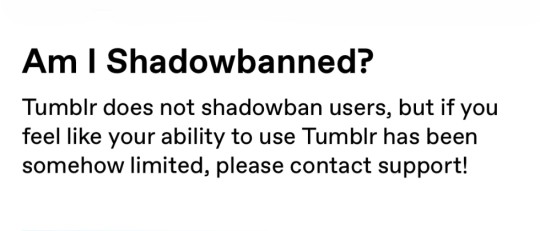

My blog has finally been restored, and I wanted to share what I’ve learned over the past week or so while my account was flagged. If you’re experiencing something similar, I hope you find this information useful.
While Tumblr states they don’t “shadowban” users, your blog can still get flagged by the anti-spam bot and restricted without actual notice, which in my opinion doesn’t make it less of a shadowban (sorry, Tumblr). When this happens, your posts lose visibility—they won’t appear on tag pages, recommendations, or the dashboard for most users. Social features are also restricted: you can’t comment, reply, send or receive asks, or use your messages or inbox. You can still interact with the posts, like and reblog, but it won’t show up in notes, and creators will only receive blank notifications. This creates the illusion that you’re using Tumblr as usual, but in reality, your blog has zero visibility and engagement—well, it’s called “shadowban” for a reason.
In my case, I noticed a steep decline in engagement and discovered my posts were no longer appearing on tag pages. I filed a ticket under the “Tags” category, but after several days of waiting, I filed a second ticket under “Social Features” based on advice from other users. From what I’ve read, including on an unofficial Tumblr troubleshooting subreddit (yes, there is one), tickets from flagged accounts are sent to the 'Safety' team for moderation, a process that can take some time, bypassing the support team, which seems counterintuitive to me. With still no reply, I reached out to Tumblr Support directly via Twitter. While they gave the same generic response about processing times, my ticket was resolved the same day.
A word of caution: be wary of scammers offering to “help” restore your account. I received several such replies, all of which were concealed, but it’s still something to watch out for.
Tumblr Support eventually confirmed my blog was flagged by the anti-spam bot and restored its functionality. Although they returned my initial "Tags" ticker, ironically, my older posts remain unsearchable and off Tumblr entirely (around a year’s worth of posting). And I’m not sure this is reversible. While I understand the need to maintain a safe and healthy community, the current system causes significant, often irreversible damage to regular blogs. It needs reworking to avoid unfairly impacting users. At the very least, there should be some mild moderation to verify if a flag was justified and clear notifications when a blog is concealed. Tumblr already has a system for sensitive content that hides individual posts and notifies users to review them—why not adopt a similar approach for spam suspects? (I’ll leave that up to the Tumblr team @staff @support)
While I’m not entirely sure what triggered the flag, among other possible causes, some users suggest it might be the use of a VPN. In my case, this makes sense. I often use it to access websites blocked in my region and sometimes forget to turn it off when switching back to Tumblr. If you use a VPN, be cautious!
You may find a lot of similar accounts on Tumblr. I highly recommend reading the “All About Shadowban” post by @that-damn-girl (it has 12k notes, and clearly suggests how relevant this issue is). I also checked the recent experiences shared by @smbhax and @elliespuns. Their blogs made me feel much less alone in this situation.
I’ll update this post if I learn more, but for now, I hope this helps.
UPD: So I sent the support team a follow up to ask about my concealed posts, and they were very kind to reassure me that all posts should be reinstated within 24 hours—and sure enough, they were! Everything is back to normal now.
#how to tumblr#shadowban#tumblr shadowban#shadowban test#tumblr support#tumblr tips#tumblr guidelines#tumblr#newbie guide#tumblog#blog#social media#staff#support#tumblr staff#tumblr problems#tumblr help#tumblr issues#tumblr staff please#tumblr community
23 notes
·
View notes
Note
Hi Mindy!!! I hope you’re doing well, and I just wanted to say that I love your posts. Really well written and thought out!
I just wanted to ask.. can you create a guide for preparing to a completely new school which isn’t, like basic? Not in a mean way, but lots of the advice on the internet is generic.
For any extra info, I’ll be joining in the second semester, so there’s plenty of time to make long term changes. It’s also a private school, but I don’t know if that will make a difference.
Thank you in advance 💖 love you!
hi sweetness! @prettieinpink thank you for your adorable ask 🌸 i'm so happy to see this from you!!!!! i'd love to help you from personal experience, and things i documented being in private school. please make sure you look at the 10 secrets because they're super helpful and things i've personally used. i'm going to pour my heart into this comprehensive guide for you. transitioning to a new private school mid-year can feel overwhelming, but i've got you covered with everything you need to know! love youu <333
the ultimate guide to conquering your new private school journey: a glowettee exclusive


by mindy ♡ @glowettee
pre-arrival preparation (1-2 months before)
academic groundwork:
request detailed course syllabi from your future teachers
create a comprehensive academic portfolio of your previous work
research the school's grading system and academic expectations
familiarize yourself with any specialized learning platforms
set up digital organization systems (i use notion + google calendar + xTiles)
purchase textbooks early and start preliminary reading
research the school's academic support resources
understand the homework and assignment submission policies
social preparation:
create a private social media presence specifically for school
research student organizations and clubs that accept mid-year members
join class-specific group chats or discussion boards
study the school's social media presence to understand culture
prepare conversation starters based on school activities
research any school traditions or special events
understand the social hierarchy (yes, private schools have these!)
identify potential mentor opportunities or buddy systems
practical essentials:
develop a morning routine that starts 30 minutes earlier than needed
create a capsule wardrobe that aligns with dress code
invest in high-quality school supplies that last
organize your study space at home
set up a dedicated homework station
create emergency supply kits for your locker and bag
establish a meal prep system for lunch and snacks
plan transportation routes and backup options
digital organization:
set up a comprehensive notion dashboard (i'll share my template soon!)
create specific folders for each subject in google drive
download all necessary academic apps
set up a digital calendar with color coding
create assignment tracking spreadsheets
establish a backup system for important documents
organize email folders for school communication
set up notification systems for important deadlines
mental and emotional preparation:
start journaling about your goals and fears
establish healthy boundaries for social interactions
create a stress management toolkit
develop positive self-talk mantras
plan regular self-care activities
identify potential support systems
create a growth mindset framework
establish regular check-in times with parents/guardians
first week survival guide:
day one essentials:
arrive 30 minutes early
bring extra supplies
wear something comfortable but polished
pack emergency essentials
keep your schedule easily accessible
bring a small notebook for important information
have your introduction speech ready
prepare questions for teachers and peers
social navigation:
observe before participating
sit in different locations to meet various groups
join lunch conversations naturally
show interest in others' experiences
take notes on names and interests
identify potential study partners
respect existing social dynamics
be authentically yourself while observing school culture
long-term success strategies:
academic excellence:
create weekly study schedules
establish relationships with teachers early
join or create study groups
maintain detailed notes from day one
schedule regular review sessions
utilize teacher office hours
keep a detailed assignment tracker
create subject-specific study guides
social integration:
participate in school events
volunteer for school activities
join at least one club or team
attend school sports events
participate in school traditions
create study groups
organize small social gatherings
maintain connections with existing friends
personal growth:
set monthly academic and social goals
maintain a gratitude journal
create a personal development plan
establish healthy stress management techniques
develop time management skills
build positive relationships with staff
create a balance between academics and social life
regularly evaluate and adjust your strategies
pro tips from my experience:
keep a spare set of supplies in your locker
create a school-specific emergency kit
maintain a digital photo of your schedule
establish a homework routine from day one
create a support network outside of school
document your journey through photos or journals
maintain open communication with teachers
celebrate small victories and progress
10 secret tips that transformed my private school journey ♡
the bathroom rule always scout out the least-used bathrooms in your first week, but don't just look for any quiet bathroom - look for one that's strategically located between your most stressful classes. trust me on this - i found my favorite quiet bathroom on the third floor of the science building, and it became my secret sanctuary for quick meditation breaks, makeup touch-ups, or just moments of peace between classes. the lighting there was immaculate for those confidence-boosting mirror talks, and it was far enough from the main hallways that you could actually hear yourself think. i even started keeping a small essential oil roller in my bag to make these mini-breaks feel more spa-like. this space became my personal reset button during hectic days, especially during exam seasons or when social dynamics felt overwhelming.
teacher connection hack bring a small notebook specifically for writing down personal details teachers mention (their favorite books, coffee preferences, hobbies, their children's names, or even their pets). this isn't about being a teacher's pet - it's about building genuine human connections. i started bringing my teacher's favorite starbucks drink on presentation days, remembering to ask about their weekend plans they mentioned, or sharing articles related to their interests. not only did it make their day, but it also showed i paid attention to details. these small gestures created authentic relationships that made a huge difference during finals week, college recommendation season, and even when i needed extensions during tough times. remember, teachers are people first, and when they see you acknowledging their humanity, they're more likely to understand yours.
social currency secret keep a small emergency kit with hair ties, bobby pins, bandaids, mints, tampons/pads, tide-to-go pens, pain relievers (if allowed), small sewing kit, clear nail polish for tights runs, double-sided tape, and even a phone charger in your locker. nothing creates instant friendships like being the person everyone knows they can count on for emergency supplies. i actually met my best friend because i had a spare hair tie when she desperately needed one before her presentation, and that simple moment turned into a three-hour conversation after school. this kit isn't just about having supplies - it's about being the person who thinks ahead and cares enough to help others. i started keeping track of what people borrowed most often and would stock up accordingly. it's like having your own little convenience store of kindness.
the popularity paradox here's something no one tells you - in private schools, being overly eager to be popular actually makes you less popular. the social hierarchy in private schools is often more subtle and complex than in public schools. i learned to focus on being genuinely interested in others instead of trying to fit in, asking thoughtful questions about their interests, and remembering small details about their lives. surprisingly, the moment i stopped trying to be part of the "it" crowd was when people started naturally gravitating towards me. i focused on developing my own interests and passions, which made me more interesting to others. the key is to be confidently authentic rather than strategically social. this approach not only helped me build real friendships but also protected me from the exhausting game of trying to maintain a carefully crafted social image.
the uniform advantage even with strict uniform rules, there are always creative ways to stand out while staying within the guidelines. i invested in high-quality accessories that complied with dress code but made my uniform look more polished - pearl earrings, delicate necklaces, classic watches, and subtle hair accessories. these small details helped me feel more put together and confident. but it's not just about the accessories - it's about how you wear the uniform itself. i learned that having my shirts professionally pressed, skirts properly hemmed, and shoes well-maintained made a huge difference in how put-together i looked. i also kept a small steamer in my locker for emergency touch-ups. this attention to detail showed respect for the school's traditions while allowing my personal style to shine through in acceptable ways.
the lunch table strategy don't commit to one lunch table for at least two weeks, and be strategic about your rotation schedule. i created a subtle system where i would sit with different groups each day, making mental notes about the dynamics, interests, and personalities at each table. i rotated between different groups, which helped me understand the social dynamics better and prevented me from being boxed into one clique too early. pay attention to how each group interacts - some tables are for studying, others for gossip, and some for genuine conversations. i kept a small note in my phone about each group's interests so i could contribute meaningfully to conversations. this strategy gave me the freedom to form genuine connections across different social circles and ultimately helped me choose where i truly felt comfortable. by the third week, i had a clear understanding of where i naturally fit in, rather than where i thought i should be.
the academic alliance create study guides and share them with classmates before they ask, but make it systematic and sustainable. i started a google drive folder with my notes and study guides, organized by subject and topic, with clear summaries and practice questions. it naturally evolved into a collaborative study group where everyone contributed their strengths. i became known as someone who not only shared resources but also helped others understand how to create their own study materials. this approach created a reciprocal learning environment where everyone felt comfortable asking for and offering help. i even created templates for different types of assignments that we could all use, which saved everyone time and helped maintain consistent quality in our work.
the extracurricular edge join at least one unexpected club that's not typically "popular," but don't just join - become actively involved in ways that showcase your unique talents. i joined the astronomy club despite it being small, and instead of just attending meetings, i started organizing stargazing events and creating instagram-worthy posts about our activities. this not only helped grow the club but also showed others that you can make any activity exciting if you're passionate about it. the unexpected benefit was meeting people who shared my genuine interests rather than just social aspirations. these authentic connections often lead to the most meaningful friendships and impressive college application stories.
the social media strategy create a finsta (private instagram) specifically for close school friends, but treat it as a carefully curated space rather than just another social media account. wait at least a month before adding anyone - this gives you time to understand the social dynamics and ensure you're connecting with the right people. i used my finsta to share study tips, funny school moments, and support for others' achievements. it became a safe space for sharing real moments with trusted friends, away from the pressure of maintaining a perfect image on main accounts. i also used it to organize study groups and share helpful resources, making it both social and practical.
the legacy link learn about your school's history and traditions from older students, but go beyond just knowing the basics. i spent time talking to seniors, alumni, and even teachers about the school's evolution over the years. understanding why certain traditions started, knowing the stories behind school legends, and learning about notable alumni helped me feel more connected to the school community. i created a digital notebook of these stories, which became a valuable resource for other new students. this knowledge made me feel like part of something bigger than just my current school year and helped me appreciate the school's culture on a deeper level.
personal advice from my heart to yours:
sweetness, i want you to know that the first few months at a new private school can feel like you're learning a new language - everyone seems to know the words and customs except you. i remember feeling so out of place during my first semester, constantly second-guessing myself and wondering if i was "doing it right." that feeling of being an outsider would hit me hardest during school traditions or inside jokes that everyone else seemed to understand instinctively. i spent countless nights journaling about feeling like i was watching my school life through a window, wondering when i would finally feel like i belonged. but here's what i learned: that feeling of being an outsider is actually your superpower. you have fresh eyes to see things differently, and that perspective is valuable. you notice things that others have become blind to, and you bring new energy to old traditions. your unique viewpoint can actually help breathe new life into established social circles and activities.
the most important thing i wish someone had told me is that it's okay to take your time finding your place. private schools often have students who've been together since kindergarten, and it can feel impossible to break into those established circles. but here's the truth - while everyone else is trying to maintain their image and social position, you have the freedom to be authentically yourself from day one. you don't have to carry the weight of years of expectations or predetermined roles. focus on building genuine connections rather than strategic ones. keep your grades up, but don't let academic pressure steal your joy. document your journey - take photos, keep a journal, save little mementos. these will become precious reminders of your growth. remember that every single person who seems perfectly adjusted now once stood exactly where you are, feeling exactly what you're feeling. and most importantly, remember that the version of you that walks into that school on day one isn't the same version that will emerge at the end of the year - and that's exactly how it should be. you're not just adapting to a new school; you're growing into a newer, stronger version of yourself. embrace this transformation with open arms.
sending you the warmest hugs and all my support! feel free to message me anytime for more specific advice or just to chat about your journey 🤍
mindy x
p.s. would you loves be interested in detailed posts about my notion templates and organization systems? let me know in the reblogs/replies!

#study tips#studyblr#studying#academia#academic#school tips#school advice#private school#private school tips#new school guide#school guide#study motivation#study inspiration#school life#student life#student advice#student tips#academic tips#academic advice#school preparation#prep school#prep school life#prep school tips#school organization#organization tips#school social life#social advice#academic success#school success#school transition
27 notes
·
View notes
Text

what are they discussing? place your bets now because i don't know either.
#all the care guide says is 'biomass'#miravi.txt#monster prom#art#digital art#i have now. fixed aaravi being oversized here-#she is back to being normally sized with her wifey#btw this isnt a happy miri face. its a shocked miri face.#shes just a merfolk so like. hard to read.#but its. eyes/pupils wide. mouth open. fins flared. arms/hands splayed. etc.#on top of the head turning like that showing a more sudden glance aside#but i like that about merfolk. i like them being kinda hard to read emotions-wise. even for miri who's quite human socialized.
33 notes
·
View notes
Text
werewolf bernard x witch tim
#thinking of this in terms of bitten wolf bernard who seeks out tim bc he’s the most proficient at potions and remedies#looking for a cure bc he already doesnt feel normal or like he fits in society and this has just amplified that to the extreme#not feeling like himself and just massive amounts of discomfort in his body bc of the changes that he’s facing#heightened senses and a deep yearning for some type of connection (wolfs are pack animals)#and tim who has to break the new that bernard’s stuck with this for the rest of his life#but who doesnt want him to go through this alone bc he knows what thats like and he doesnt wish that on anyone#guiding him through all the changes and slowly filling that sense of pack to bernard#tim who has closed himself off and exist in this little corner of the world to limit any type of socialization bc of a accident that happen#early in him coming into his magic#them helping each other bernard learning to live with his new normal and tim learning its okay to lean on others#blah blah blah#im literally just yapping in these tags (sorry)#they really could work for any type of supernatural pairing#i just really like the idea of werewolf bernard#timbern#timber#bernard dowd#tim drake#dc
55 notes
·
View notes
Text
○ Hi, TikTok people! ○
Soooo, I rarely ever make posts that address current events like this. Additionally, I doubt that most people on TikTok will be take refuge on Tumblr of all places. That being said, if you happen to be a newcomer to this site who came from TikTok, welcome! It's so nice to have you here!! We're so glad to see you. Now, here's the thing about Tumblr-- Tumblr and Tiktok are basically polar opposites. Lemme rephrase that; there's a lot to learn if you don't know much about here.
So, here's some tips to get you started!
[ Press "keep reading" to continue! ]

• Reblog, reblog, reblog. Reblogging is a way for artists, text posts, and other posts to get seen! It shows them to more people since this site really doesn't have any algorithm. You can reblog literally anything you want as long as the post doesn't have reblogs turned off. Did that text post make you laugh? Reblog it! Did you like that fanfic concept? Reblog it! Did you like that art? Reblog it! You don't need to if you don't want to, but it's very much allowed. "Will I cross someone's boundaries if I reblog too many times?" Nope. Reblog as much as you want, be as weird as you want. Plenty of artists on here take it as a compliment and a sign of excitement. You don't need to be as afraid on here.

• THERE IS NO ALGORITHM!! Everyone on Tumblr over here is equal and clout means basically nothing over here. We just like cool art, funny stuff, and cool ideas. Post your stuff to the tag and just watch as people who are interested in it come to you. We're just here to have fun--this isn't a game of clout. Sit back, relax, and find your people! The days of clout are no more.

• We Tumblr users LOVE reading and writing! It's in our nature. So you're probably gonna see a lot of long posts on here with blocks of texts. Don't be scared of it, check some of them out! That said, short but sweet posts are fun over here too. Feel free to type as much as you want. We have unlimited text over here! It's so cool.

• Speaking of writing and tags, remember how you had to censor your words on TikTok? No need. You can say literally whatever over here and you don't have to fear getting banned. The days of "unalive" and "sewer slide" are ALSO no more. SPEAKING OF WHICH. A lot of users still put tws on their posts and tags. If you're shoving it in the tags, PLEASE do not censor it. It won't filter it if they're using a blacklist.

• The first thing you should do over here after you get your account set up if make your blog look special. Change it to whatever color you want, change the font of your title, change your title to something funny, and change your pfp and banner. It's all to make it you! It also doesn't matter if it's something random for now--us Tumblr users are very wary against bots, and we often block anyone who doesn't have a customized account. Just take your time and have fun, but make sure you don't get blocked by the people you don't want to block you over something silly like looking like a bot!

• You can post videos on here too! Feel free to upload old TikToks you save! I've seen a lot of other TikTok refugees who want to see some old content. I never was on TikTok, though I think it'd be neat to see your old stuff.

• There's lots of communities on here for even the smallest of stuff. If you have a niche interest, go ahead, include it into your introduction-- no one will judge on here and you just might find someone else who's just as crazy over it. You can check the tags for other people who posted about it, too! It's fun to go scrolling through the tags. I included Ducktales 2017 in my interests list--I didn't lose any cool points. I even still post about it! Literally be as weird as you want. We don't care, you have no limits. This is a fandom haven!

• You can have opinions here. Post about the most random crap you want and spit whatever opinions you have, people are very non-confrontational on here. Use your blocklist, you have it for a reason. Blacklist tags you don't want to see. Again, be as weird as you want. You WILL find your people. Just don't go fighting people--unlike TikTok, we'd rather live our lives on here and having beef with other people isn't going to give anyone any clout. You're GOING to see upsetting stuff and opinions that conflict yours (after all, there's no algorithm), but that's okay. Just engage in your interests, speak your opinions, block when you neef to, and enjoy.

Other tumblr users, feel free to add any extra points in the replies!
Oh, and if you're a TikTok refugee who happened to read this, feel free to introduce yourself in the replies. I like meeting new people and it'd feel nice to know this helped someone!
~ Sincerely, Iridesky, a weird individual who loves writing and has way too many interests to count
21 notes
·
View notes